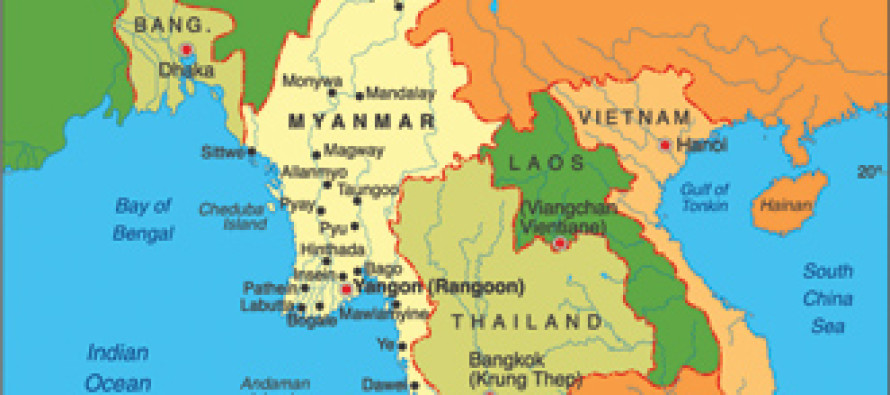Is Myanmar acquiring nuclear weapons?

Foreign media is awash with news that Myanmar (Burma) is building a secret nuclear reactor and plutonium extraction facilities with North Korean help, with the aim of acquiring its first nuclear bomb in five years.
The recent aborted voyage of a North Korean ship, photographs of massive tunnels have raised concern in many countries that Myanmar may be aspiring to join the nuclear club — with help from Pyongyang.
China and other Asian nations had recently helped persuade Myanmar to turn back a North Korean freighter, the Nam Kam 1, that was being shadowed by US warships on its way to Myanmar with an unknown cargo.
.
In June, photographs, video and reports showed as many as 800 tunnels into a mountain at Naung Laing, some of them vast, dug in Myanmar with North Korean assistance under an operation code-named “Tortoise Shells.” The photos were reportedly taken between 2003 and 2006.
The secret complex runs parallel to a civilian reactor being built at another site by Russia that both the Russia and Myanmar say will be put under international safeguards.
It is reported a spokesman for the self-styled Myanmar government-in-exile, says according to people working with the dissident movement inside the Myanmar army, there are two heavily guarded buildings under construction “to hold nuclear reactors” in central Myanmar. Villagers in the area have been displaced, said spokesman Zinn Lin.
It is further reported that two defectors were extensively interviewed separately over the past two years in Thailand by the Australian National University strategic expert Desmond Ball and a Thai-based Irish-Australian journalist, Phil Thornton, who has followed Myanmar for years.
One was an officer with a secret nuclear battalion in the Myanmar army who was sent to Moscow for two years’ training; the other was a former executive of the leading regime business partner, Htoo Trading, who handled nuclear contracts with Russia and North Korea.
Australian Professor Ball said a Moscow-trained Myanmar army defector was picked up by US intelligence agencies early last year. Some weeks later, Myanmar protested to Thailand about overflights by unmanned surveillance drones that were apparently launched across Thai territory by US agencies.
Sometime at the end of June, Japanese police reportedly arrested a North Korean and two Japanese for allegedly trying to export illegally to Myanmar a magnetic measuring device that could be used to develop missiles.
In a rare comment from inside Myanmar, Chan Tun, former ambassador to North Korea turned democracy activist, reportedly told the Thailand-based Irrawaddy magazine, “To put it plainly: Myanmar wants to get the technology to develop a nuclear bomb”..
Washington is increasingly concerned that Myanmar could be acquiring nuclear technology from North Korea, after Israel destroyed in September 2007 a reactor the North Koreans were apparently building in Syria.
And a recent report from Washington-based Radio Free Asia and Myanmar exile media said senior Myanmar military officers made a secret visit late last year to North Korea, where an agreement was concluded for greatly expanding cooperation to modernize Myanmar’s military, including the construction of underground installations.
At a meeting with Asian leaders, including from Myanmar and North Korea, in Thailand at the end of July, the US Secretary of State, Hillary Clinton, and other foreign ministers won promises from Myanmar delegation they would adhere to United Nations sanctions on North Korean nuclear and missile exports.
.Observers believe the hints emerging from various accounts and sightings of North Korean delegations in Myanmar sharply focuses the fact the Myanmar leaderships are seeking a deterrent to any foreign-inspired ‘‘regime change’’.
The reported story will have serious repercussions across Asia, in particular in South East Asia.. ‘‘The evidence is preliminary and needs to be verified, but this is something that would completely change the regional security status quo,’’ said Thitinan Pongsudhirak, the head of Thailand’s Institute of Security and International Studies. This nuclear weapon move jeopardises the security and wellbeing of its immediate neighbours.’
It is reported that Senator James Webb of US Congress visited Myanmar on 15-16 th August that he reportedly said while he did not discuss the nuclear issue directly with the top leader Senior General Than Shwe, “it was communicated to me that there was no truth to that from a very high level in the government.”
Myanmar is a party to the Nuclear Nonproliferation Treaty, and under a safeguard agreement with the International Atomic Energy Agency, it is obligated to let the U.N. watchdog know at least six months in advance of operating a nuclear facility, IAEA spokesman Ayhan Evrensel said.
If the report is correct, then Bangladesh will have two immediate neighbours which have nuclear weapons. The scenario does not seem comfortable for people of Bangladesh.
By Barrister Harun ur Rashid
Former Bangladesh Ambassador to the UN, Geneva.


